一般将来时语法讲解
初中数学一般将来时专项语法讲解

初中数学一般将来时专项语法讲解一般将来时是表示将来某个时间要发生的动作或事件。
在初中数学中,很多时候我们需要描述将要发生的事情,使用一般将来时就尤为重要了。
I. 构成方法一般将来时由“will/shall + 动词原形”构成。
其中 shall 用得较少,will 是最主要的情态动词。
例如:I will go to school tomorrow.陈述句否定句构成如下:陈述句:I will see you tomorrow.否定句:I will not see you tomorrow.疑问句构成如下:一般疑问:Will you see me tomorrow?(肯定回答:Yes, I will.否定回答: No, I won't.)特殊疑问:What will you do tomorrow? (回答:I will go to school.)II. 动词用法将来时态只是时间状语,用途相当于陈述一件在未来某个时间会发生的事情,如“明天”,“下周”等。
* 表示未来的计划或决定:I will travel next month.* 表示意愿或承诺:I will help you with your homework.* 表示在未来一段时间内会经常发生的动作、或在未来发生的动作是一种惯:He will play basketball every morning.* 表示未来某个时间衔接发生的动作:I will wake up, and then I will brush my teeth.* 表示偶然发生的事情:There will be a party at my friend's house tomorrow.III. 练题1. 我明天早上6点起床。
2. 他下下个月去伦敦。
3. 他会在这个周末打篮球。
4. 我会帮你研究数学。
5. 当你到机场时,我会等你的。
答案:1. I will wake up at 6 tomorrow morning.2. He will go to London next month.3. He will play basketball this weekend.4. I will help you with studying mathematics.5. I will wait for you when you arrive at the airport.初中数学一般将来时是数学学习中的重要部分,希望这份语法讲解能帮助学生更好地掌握此知识点。
初二英语语法分析--一般将来时用法讲解
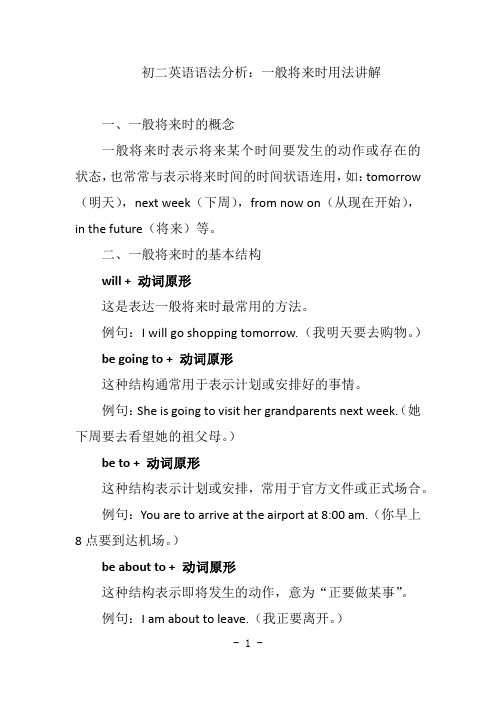
初二英语语法分析:一般将来时用法讲解一、一般将来时的概念一般将来时表示将来某个时间要发生的动作或存在的状态,也常常与表示将来时间的时间状语连用,如:tomorrow (明天),next week(下周),from now on(从现在开始),in the future(将来)等。
二、一般将来时的基本结构will + 动词原形这是表达一般将来时最常用的方法。
例句:I will go shopping tomorrow.(我明天要去购物。
)be going to + 动词原形这种结构通常用于表示计划或安排好的事情。
例句:She is going to visit her grandparents next week.(她下周要去看望她的祖父母。
)be to + 动词原形这种结构表示计划或安排,常用于官方文件或正式场合。
例句:You are to arrive at the airport at 8:00 am.(你早上8点要到达机场。
)be about to + 动词原形这种结构表示即将发生的动作,意为“正要做某事”。
例句:I am about to leave.(我正要离开。
)be due to + 动词原形这种结构表示某事预定或预期将要发生。
例句:The train is due to arrive at 5:00 pm.(火车预定下午5点到达。
)三、一般将来时的用法1表示将来的动作或状态例句:I will buy a new car next year.(明年我要买一辆新车。
)2表示将来的计划或安排例句:We are going to have a picnic this weekend.(我们这个周末要去野餐。
)3表示根据现有情况推测未来的可能性例句:It's going to rain soon.(很快就要下雨了。
)4表示命令、请求、建议等例句:You are to finish your homework before you go out.(你出去之前要把作业做完。
英语语法:一般将来时解释集

英语语法:一般将来时解释大全一、基本定义一般将来时是英语时态的一种,表示将来的动作或状态。
它主要用于描述未来的计划、预测或期望发生的事情。
二、形式构成一般将来时的构成主要有以下几种形式:1. 基本结构:主语+ will /shall + 动词原形+ 其他成分。
这是最基本的一般将来时形式,表示将来的动作或状态。
2. be going to 结构:主语+ be(am, is, are)going to + 动词原形+ 其他成分。
这种结构表示计划或安排将要发生的事情,也可以表示根据目前的迹象或情况预测将会发生的事情。
3. be+动词不定式:主语+ be(am, is, are)to + 动词原形+ 其他成分。
这种结构表示计划或安排将来要做的事情。
4. be+动词ing:主语+ be(am, is, are)+ 动词ing形式+ 其他成分。
这种结构表示即将发生的动作,通常与“when”连用。
5. be+表示时间的介词短语:主语+ be(am, is, are)+ 表示时间的介词短语。
这种结构用于表示将来某个时间点的情况。
6. 将来时间状语:tomorrow, next week, in the future等以上就是一般将来时的主要构成形式。
需要注意的是,在具体使用时,应根据语境和上下文选择合适的构成方式。
三、用法场景1. 表达未来的计划或意图,例如:I will go to the beach next summer.2. 描述未来的预测或期望,例如:It will rain this afternoon.3. 在条件句中表示将来的结果,例如:If you study hard, you will pass the exam.四、与其他时态的区别1. 与现在进行时态的区别:现在进行时态强调正在进行的动作,而一般将来时态强调将来的动作或状态。
2. 与过去时态的区别:过去时态表示过去的动作或状态,与将来时间无关。
一般将来时的基本结构和用法
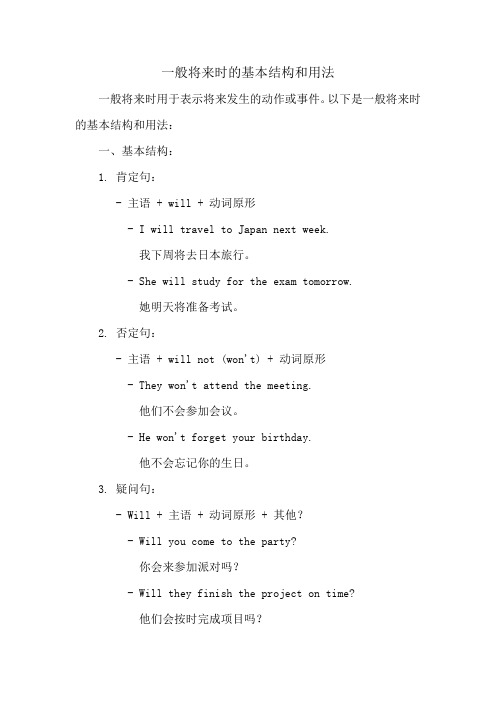
一般将来时的基本结构和用法
一般将来时用于表示将来发生的动作或事件。
以下是一般将来时的基本结构和用法:
一、基本结构:
1. 肯定句:
- 主语 + will + 动词原形
- I will travel to Japan next week.
我下周将去日本旅行。
- She will study for the exam tomorrow.
她明天将准备考试。
2. 否定句:
- 主语 + will not (won't) + 动词原形
- They won't attend the meeting.
他们不会参加会议。
- He won't forget your birthday.
他不会忘记你的生日。
3. 疑问句:
- Will + 主语 + 动词原形 + 其他?
- Will you come to the party?
你会来参加派对吗?
- Will they finish the project on time?
他们会按时完成项目吗?
二、用法:
- 表示将来发生的动作或事件。
- 表示预测、承诺、意图、计划等将来的行为或状态。
- 通常与表示将来时间的时间状语连用,如 tomorrow, next week, in the future 等。
值得注意的是,一般将来时通常用于与将来相关的动作和事件,而对于已经计划或安排好的未来事件,可以使用 "be going to" 结构。
一般将来时语法知识讲解
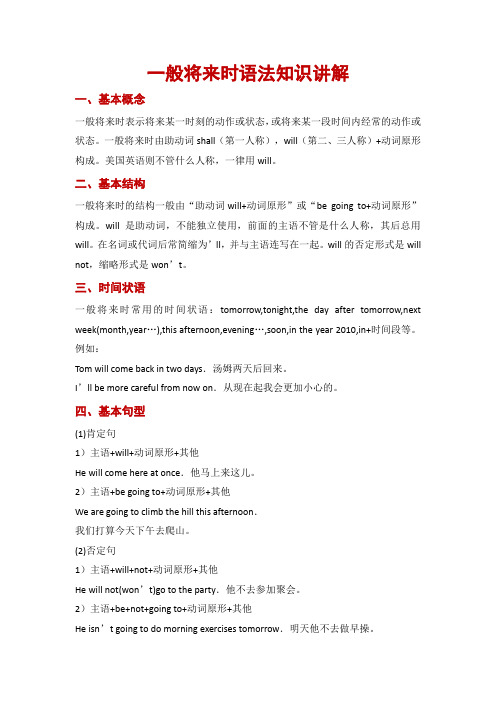
一般将来时语法知识讲解一、基本概念一般将来时表示将来某一时刻的动作或状态,或将来某一段时间内经常的动作或状态。
一般将来时由助动词shall(第一人称),will(第二、三人称)+动词原形构成。
美国英语则不管什么人称,一律用will。
二、基本结构一般将来时的结构一般由“助动词will+动词原形”或“be going to+动词原形”构成。
will是助动词,不能独立使用,前面的主语不管是什么人称,其后总用will。
在名词或代词后常简缩为’ll,并与主语连写在一起。
will的否定形式是will not,缩略形式是won’t。
三、时间状语一般将来时常用的时间状语:tomorrow,tonight,the day after tomorrow,next week(month,year…),this afternoon,evening…,soon,in the year 2010,in+时间段等。
例如:Tom will come back in two days.汤姆两天后回来。
I’ll be more careful from now on.从现在起我会更加小心的。
四、基本句型(1)肯定句1)主语+will+动词原形+其他He will come here at once.他马上来这儿。
2)主语+be going to+动词原形+其他We are going to climb the hill this afternoon.我们打算今天下午去爬山。
(2)否定句1)主语+will+not+动词原形+其他He will not(won’t)go to the party.他不去参加聚会。
2)主语+be+not+going to+动词原形+其他He isn’t going to do morning exercises tomorrow.明天他不去做早操。
(3)一般疑问句1)Will+主语+动词原形+其他?Will he help you with your English?他会帮助你学习英语吗?2)Be动词(Am,Is,Are)+主语+going to+动词原形+其他?Are you going to play computer games tomorrow afternoon?你打算明天下午玩电脑游戏吗?(4)特殊疑问句:疑问词+一般疑问句?—What will the students have for lunch today?学生们今天午饭吃什么?—They will have bread.他们将吃面包。
语法讲解一般将来时

be doing结构表示将来时间
表示按计划安排即将发生的动作
The train is leaving at 5 o'clock.
表示根据时间表或日程安排即将发生的动作
The plane is taking off in 10 minutes.
表示按计划或约定即将发生的动作
We are meeting at the restaurant at 7 tonight.
go D. will, do, go
选择题练习
答案:D
解析:根据时间状语this weekend,第一空应使用将来时态;第二空是be doing表 示将来;第三空表示个人意愿,应使用一般现在时态。
翻译练习
我将在下个月去旅行。 答案:will go
I _____ _____ on a trip next month.
1 2
表示意愿或承诺做某事
I will help you with your project if you need me.
表示临时决定做某事
I will go to the store later, I don't have any milk left.
3
表示假设条件下的将来行动
If you don't mind, I will stay for dinner.
语法讲解一般将来时
目录
• 引言 • 一般将来时的定义和构成 • 一般将来时的基本用法 • 一般将来时的特殊用法 • 一般将来时的否定句和疑问句形式 • 练习和巩固
01
引言
主题简介
一般将来时是英语语法中的一种时态,用于描述将来发 生的事件或动作。
它通常由助动词will或shall后接动词原形构成,表示未 来的行为或状态。
一般将来时态的结构和用法
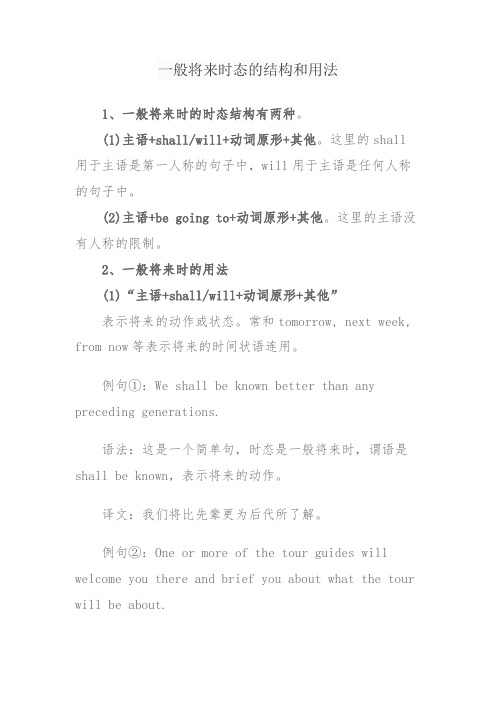
一般将来时态的结构和用法1、一般将来时的时态结构有两种。
(1)主语+shall/will+动词原形+其他。
这里的shall 用于主语是第一人称的句子中,will用于主语是任何人称的句子中。
(2)主语+be going to+动词原形+其他。
这里的主语没有人称的限制。
2、一般将来时的用法(1)“主语+shall/will+动词原形+其他”表示将来的动作或状态。
常和tomorrow, next week, from now等表示将来的时间状语连用。
例句①:We shall be known better than any preceding generations.语法:这是一个简单句,时态是一般将来时,谓语是shall be known,表示将来的动作。
译文:我们将比先辈更为后代所了解。
例句②:One or more of the tour guides will welcome you there and brief you about what the tour will be about.语法:这是一个主从复合句。
what引导的是宾语从句;主句和从句的时态都是一般将来时,谓语分别是will welcome…and brief和will be,表示将来的动作。
译文:有一个或几个导游会到那里迎接你们,并且向你们简要介绍参观的内容。
(2)“be going to+动词原形+其他”表示事先考虑过的将要发生的动作以及已有迹象表明必将要发生的某事,意为“打算,就要”。
例句:Now we go to Jane who is going to tell us about what's happening in town this weekend.语法:这是一个多重主从复合句。
who引导的是定语从句,该从句的时态是一般将来时,谓语是is going to tell;该定语从句中又包含一个由what引导的宾语从句,作介词about的宾语。
一般将来时语法点

一般将来时语法点一般将来时表示将来某个时间要发生的动作或存在的状态,也表示将来经常或反复发生的动作.常常与表示将来的时间状语连用.用will或shall表示“助动词will或shall+动词原形”这一形式,表示将来发生的事情,用于征求对方的意见或表示客气的邀请.“be going to+动词原形”结构用来表示按照主观意图打算或按计划,安排将要做的事,有“打算、就要”的意思。
也常用于表示从迹象上表明将要发生的事情,多指个人主观臆断的推测。
一、will、shall1、肯定句各种人称后都可以用will+动词原形构成将来时。
例如:He will be back soon. 他很快就会回来。
2、否定句直接在will后加not。
例如:I/We shall/will not go. You/He/She/They Will not goes.3、疑问句根据需要,将will提前,改变句子的语序。
例如:why will you be here on Sunday?(周日你为什么将要在这儿?)I will have a meeting on Sunday(我将要在周日举行一个聚会)4、Shall用于第一人称后,常用于疑问句,表示征求对方的意见。
例如:shall l turn on the light?二、be going to(1)be going to和will在含义和用法上略有不同.be going to往往表示事先经过考虑的打算;will多表示意愿、决心.两者有时不能互换.例如:He is studying hard and is going to try for the exams. 他正努力学习,准备参加考试.(2)在if之后,通常不用will表示预言,但可以用be going to表示意图.例如:If you are going to go to the cinema this evening, you’d better take your coat with you. 你若今晚去看电影,最好带着外套.(3)现在进行时和表示将来的时间状语连用,表示在最近将要发生某事.这些事是事先安排好的.例如:The Browns are coming to dinner tomorrow. 明天布朗夫妇要来吃晚饭.What are you doing tomorrow? 明天你做什么? The train is arriving at nine o'clock. 火车将在九点钟到. 在特定的上下文中,这类动词有时也可不带时间状语.。
一般将来时的表达形式
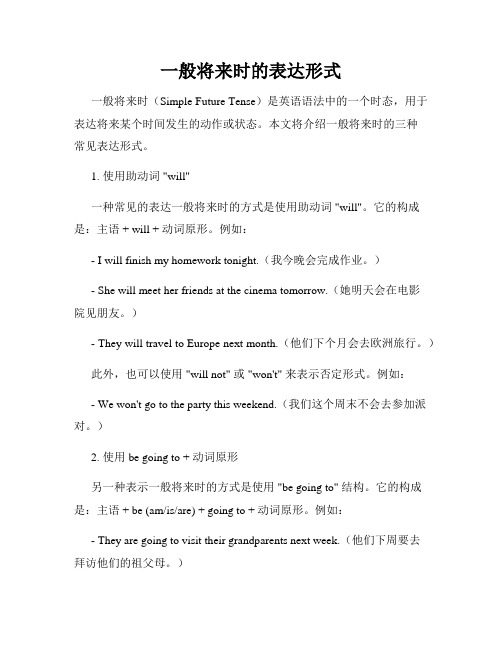
一般将来时的表达形式一般将来时(Simple Future Tense)是英语语法中的一个时态,用于表达将来某个时间发生的动作或状态。
本文将介绍一般将来时的三种常见表达形式。
1. 使用助动词 "will"一种常见的表达一般将来时的方式是使用助动词 "will"。
它的构成是:主语 + will + 动词原形。
例如:- I will finish my homework tonight.(我今晚会完成作业。
)- She will meet her friends at the cinema tomorrow.(她明天会在电影院见朋友。
)- They will travel to Europe next month.(他们下个月会去欧洲旅行。
)此外,也可以使用 "will not" 或 "won't" 来表示否定形式。
例如:- We won't go to the party this weekend.(我们这个周末不会去参加派对。
)2. 使用 be going to + 动词原形另一种表示一般将来时的方式是使用 "be going to" 结构。
它的构成是:主语 + be (am/is/are) + going to + 动词原形。
例如:- They are going to visit their grandparents next week.(他们下周要去拜访他们的祖父母。
)- I am going to learn how to play the piano.(我打算学习弹钢琴。
)- She isn't going to eat fast food anymore.(她不再打算吃快餐了。
)该结构也可以用于否定形式,只需在 "be" 后加 "not"。
英语语法一般将来时的讲解
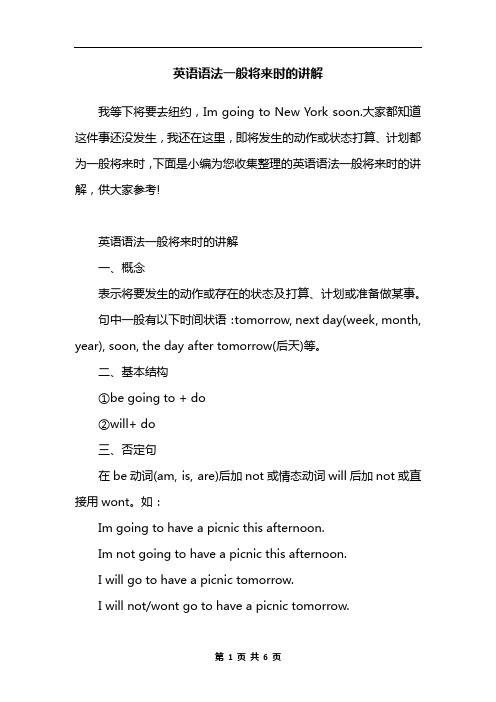
英语语法一般将来时的讲解我等下将要去纽约,Im going to New York soon.大家都知道这件事还没发生,我还在这里,即将发生的动作或状态打算、计划都为一般将来时,下面是小编为您收集整理的英语语法一般将来时的讲解,供大家参考!英语语法一般将来时的讲解一、概念表示将要发生的动作或存在的状态及打算、计划或准备做某事。
句中一般有以下时间状语:tomorrow, next day(week, month, year), soon, the day after tomorrow(后天)等。
二、基本结构①be going to + do②will+ do三、否定句在be动词(am, is, are)后加not或情态动词will后加not或直接用wont。
如:Im going to have a picnic this afternoon.Im not going to have a picnic this afternoon.I will go to have a picnic tomorrow.I will not/wont go to have a picnic tomorrow.四、一般疑问句be或will提到句首,some改为any, and改为or,第一二人称互换。
如:We are going to go on an outing this weekend.Are you going to go on an outing this weekend?五、对划线部分提问。
一般情况下,一般将来时的对划线部分有三种情况。
1. 问人。
Who 如:Im going to New York soon.Whos going to New York soon?2. 问干什么。
What 如:My father is going to watch a race with me this afternoon.What is your father going to do with you this afternoon?3. 问什么时候。
英语语法一般将来时讲解
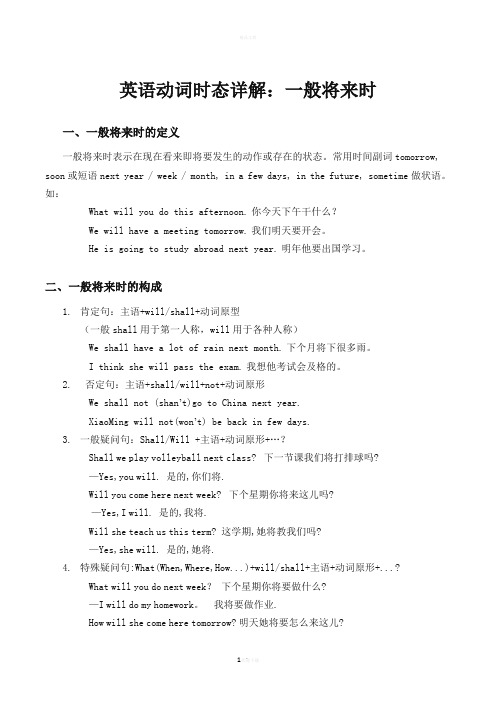
英语动词时态详解:一般将来时一、一般将来时的定义一般将来时表示在现在看来即将要发生的动作或存在的状态。
常用时间副词tomorrow, soon或短语next year / week / month, in a few days, in the future, sometime做状语。
如:What will you do this afternoon.你今天下午干什么?We will have a meeting tomorrow.我们明天要开会。
He is going to study abroad next year.明年他要出国学习。
二、一般将来时的构成1.肯定句:主语+will/shall+动词原型(一般shall用于第一人称,will用于各种人称)We shall have a lot of rain next month.下个月将下很多雨。
I think she will pass the exam.我想他考试会及格的。
2.否定句:主语+shall/will+not+动词原形We shall not (shan’t)go to China next year.XiaoMing will not(won’t) be back in few days.3.一般疑问句:Shall/Will +主语+动词原形+…?Shall we play volleyball next class?下一节课我们将打排球吗?—Yes,you will.是的,你们将.Will you come here next week?下个星期你将来这儿吗?—Yes,I will.是的,我将.Will she teach us this term?这学期,她将教我们吗?—Yes,she will.是的,她将.4.特殊疑问句:What(When,Where,How...)+will/shall+主语+动词原形+...?What will you do next week?下个星期你将要做什么?—I will do my homework。
初中英语语法——一般将来时详细讲解
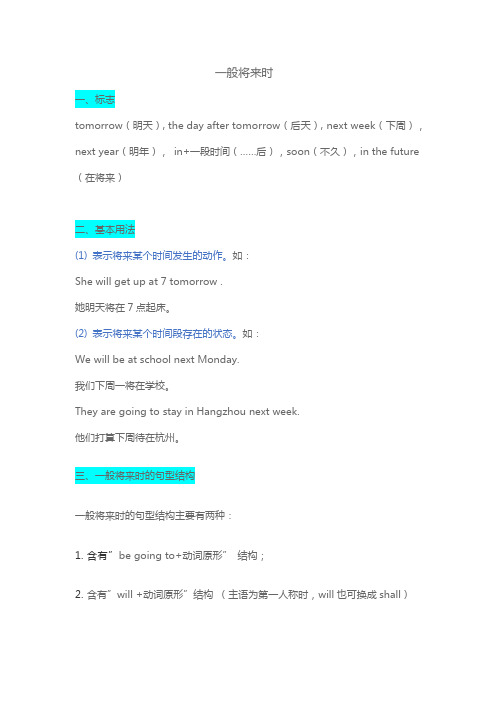
一般将来时一、标志tomorrow(明天), the day after tomorrow(后天), next week(下周),next year(明年),in+一段时间(……后),soon(不久),in the future (在将来)二、基本用法(1) 表示将来某个时间发生的动作。
如:She will get up at 7 tomorrow .她明天将在7点起床。
(2) 表示将来某个时间段存在的状态。
如:We will be at school next Monday.我们下周一将在学校。
They are going to stay in Hangzhou next week.他们打算下周待在杭州。
三、一般将来时的句型结构一般将来时的句型结构主要有两种:1.含有”be going to+动词原形”结构;2.含有”will +动词原形”结构(主语为第一人称时,will也可换成shall)(1)肯定句:She is going to buy some vegetables tomorrow morning . 她打算明天上午买一些蔬菜。
(2)否定句:在be动词后加not。
is和are可以和not缩写为isn't,aren't。
She isn’t going to buy any vegetables tomorrow morning . 她明天上午不去买蔬菜。
(3)一般疑问句及其答语:将be动词放在句子开头,且首字母要大写,句末用问号。
肯定回答:Yes,主语的相应代词+am/is/are.否定回答:No,主语的相应代词+am not /isn't/aren't.—Is she going to buy any vegetables tomorrow morning?她打算明天上午去买一些蔬菜吗?—Yes,she is./No,she isn't. 是的,她打算去。
一般将来时语法总结归纳
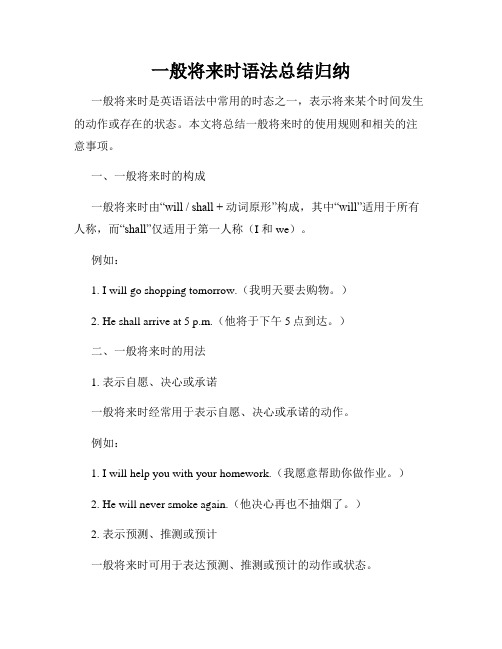
一般将来时语法总结归纳一般将来时是英语语法中常用的时态之一,表示将来某个时间发生的动作或存在的状态。
本文将总结一般将来时的使用规则和相关的注意事项。
一、一般将来时的构成一般将来时由“will / shall + 动词原形”构成,其中“will”适用于所有人称,而“shall”仅适用于第一人称(I 和 we)。
例如:1. I will go shopping tomorrow.(我明天要去购物。
)2. He shall arrive at 5 p.m.(他将于下午5点到达。
)二、一般将来时的用法1. 表示自愿、决心或承诺一般将来时经常用于表示自愿、决心或承诺的动作。
例如:1. I will help you with your homework.(我愿意帮助你做作业。
)2. He will never smoke again.(他决心再也不抽烟了。
)2. 表示预测、推测或预计一般将来时可用于表达预测、推测或预计的动作或状态。
例如:1. It will rain tomorrow.(明天会下雨。
)2. They will probably win the game.(他们很可能会赢得比赛。
)3. 表示习惯或反复发生的动作一般将来时可以用来表示根据过去的行为或事件推断将来会发生的动作。
例如:1. He will often call his parents.(他通常会给父母打电话。
)2. They will always eat dinner at home.(他们总是在家吃晚餐。
)4. 表示请求、邀请或建议一般将来时也可用于表示请求、邀请或建议的动作。
例如:1. Will you please close the window?(请你关上窗户好吗?)2. Shall we meet at the café?(我们要在咖啡馆见面吗?)三、注意事项1. 否定形式将"will not"缩写为"won't",放在动词之前。
“一般将来时”的几种语法形式

“一般将来时”的几种语法形式一般将来时是描述将来发生的动作、事件或状态的一种时态,表示将来一些时间或一些时刻发生的动作或状态。
在英语中,一般将来时有几种语法形式。
下面将详细介绍这几种形式。
1. will + 动词原形:这是一般将来时最基本、最常见的表达方式。
它主要用于表示意图、决定、预测、承诺等。
例如:- I will go to the supermarket tomorrow.(明天我会去超市。
)- She will travel to Paris next month.(下个月她会去巴黎旅行。
)- They will study for the test tonight.(他们会今晚为考试而学习。
)2. be going to + 动词原形:这种形式用于表示目的、计划、预测强烈以及基于现在的迹象或证据得出的行动。
例如:- He is going to visit his grandparents this weekend.(他计划在这个周末去看望他的祖父母。
)- They are going to buy a new car next year.(明年他们打算买一辆新车。
)- It looks like it is going to rain soon.(看起来很快就要下雨了。
)3. 动词原形: 当时间状语已经指明了将来,且主语是第一人称(I 或We)时,可以省略will或be going to,直接使用动词原形表示一般将来时。
例如:- I think I will pass the exam.(我认为我会通过考试。
)- We hope to see you next week.(我们希望下周见到你。
)4. be + going to + 动词原形:这种形式在第一人称(I或We)以外的主语中也可以使用,表示计划、安排、预测等。
例如:- He is going to start his new job next month.(他打算下个月开始新工作。
一般将来时语法知识点总结

一般将来时语法知识点总结一般将来时是表示将来发生的动作或状态的一种时态。
一般将来时的构成由助动词“will”(或情态动词“shall”在第一人称单数中)+动词的原形组成。
以下是一般将来时的相关知识点总结:1. 肯定句结构:主语 + will + 动词原形 + 其他。
例如:- I will go to the movies tomorrow.(我明天会去看电影。
)- She will help you with your homework.(她会帮你做作业。
)2. 否定句结构:主语 + will not / won't + 动词原形 + 其他。
例如:- They won't come to the party.(他们不会来参加派对。
)- He will not eat meat anymore.(他不再吃肉了。
)3. 疑问句结构:Will + 主语 + 动词原形 + 其他?例如:- Will you join us for dinner?(你会和我们一起吃晚饭吗?)- Will they visit their grandparents this weekend?(他们会在这个周末去看望他们的祖父母吗?)4. 表示计划或意愿:表示将来的某个时间或做某件事情的打算或意愿。
例如:- I will study abroad next year.(我明年将出国留学。
)- They will buy a new car soon.(他们很快会买一辆新车。
)5. 表示预测或推断:表示将来的某个状态或事件可能发生,基于推测或判断。
例如:- It will rain tomorrow.(明天会下雨。
)- She will probably pass the exam.(她可能会通过考试。
)需要注意的是,一般将来时有时可用于表示即将发生的动作,而不一定是将来的某个时间。
例如,当说话人决定或做出决定时,也可以使用一般将来时。
小学英语语法一般将来时
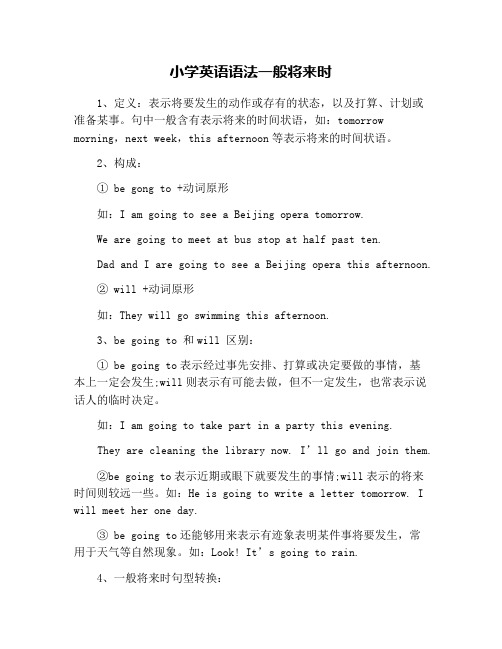
小学英语语法一般将来时1、定义:表示将要发生的动作或存有的状态,以及打算、计划或准备某事。
句中一般含有表示将来的时间状语,如:tomorrow morning,next week,this afternoon等表示将来的时间状语。
2、构成:① be gong to +动词原形如:I am going to see a Beijing opera tomorrow.We are going to meet at bus stop at half past ten.Dad and I are going to see a Beijing opera this afternoon.② will +动词原形如:They will go swimming this afternoon.3、be going to 和will 区别:① be going to表示经过事先安排、打算或决定要做的事情,基本上一定会发生;will则表示有可能去做,但不一定发生,也常表示说话人的临时决定。
如:I am going to take part in a party this evening.They are cleaning the library now. I’ll go and join them.②be going to表示近期或眼下就要发生的事情;will表示的将来时间则较远一些。
如:He is going to write a letter tomorrow. I will meet her one day.③ be going to还能够用来表示有迹象表明某件事将要发生,常用于天气等自然现象。
如:Look! It’s going to rain.4、一般将来时句型转换:肯定句/否定句/一般疑问句及回答She is going to have a picnic tomorrow./She isn’t going to have a picnic tomorrow./—Is she going to have a picnic tomorrow?—Yes, she is. / No, she isn’t.They will go swimming this afternoon./They willnot(wo n’t) go swimming this afternoon./—Will they go swimming this afternoon?—Yes, they will. / No, they won’t.。
英语语法 什么是一般将来时

英语语法什么是一般将来时一般将来时(Simple Future Tense)是英语语法中用来表示将来发生的动作、事件或状态的一种时态。
它在句子中起着重要的作用,可以帮助我们准确描述未来的计划、意图或预测。
在这篇文章中,我将详细探讨一般将来时的用法和构造,以及一些常见的例子。
请注意,这是一个详细的讨论,所以文章会比较长。
让我们开始吧!一、一般将来时的构造一般将来时的构造非常简单,主要由助动词"will"或"shall"加上动词的原形构成。
下面是一些例子:1. I will go to the party tomorrow.我明天会去参加派对。
2. She will study abroad next year.她明年会出国留学。
3. They will visit their grandparents this weekend.他们这个周末会去看望他们的祖父母。
4. We shall meet at the park.我们将在公园见面。
5. He will not come to the meeting.他不会来参加会议。
6. Will you help me with my homework?你会帮我做作业吗?二、表示计划和意图一般将来时常常用来表示将来的计划、意图或打算。
下面是一些例子:1. We will have a meeting tomorrow.我们明天会开会。
2. She will start a new job next month.她下个月会开始一份新工作。
3. They will travel to Europe next summer.他们明年夏天会去欧洲旅行。
4. I will buy a new car next year.我明年会买辆新车。
5. He will learn to play the piano.他会学弹钢琴。
6. We shall visit our friends in the evening.我们晚上会去拜访我们的朋友。
【语法】一般将来时
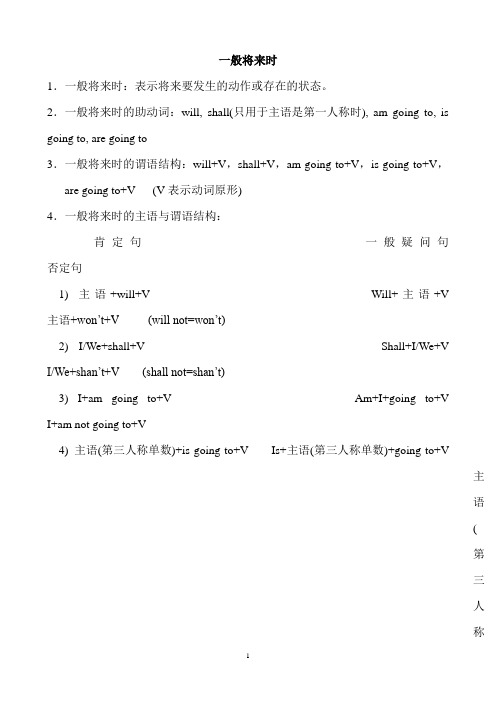
一般将来时1.一般将来时:表示将来要发生的动作或存在的状态。
2.一般将来时的助动词:will, shall(只用于主语是第一人称时), am going to, is going to, are going to3.一般将来时的谓语结构:will+V,shall+V,am going to+V,is going to+V,are going to+V (V表示动词原形)4.一般将来时的主语与谓语结构:肯定句一般疑问句否定句1) 主语+will+V Will+主语+V主语+won’t+V (will not=won’t)2) I/We+shall+V Shall+I/We+VI/We+shan’t+V (shall not=shan’t)3) I+am going to+V Am+I+going to+VI+am not going to+V4) 主语(第三人称单数)+is going to+V Is+主语(第三人称单数)+going to+V主语(第三人称单数)+isn’tgoingto+V 5) 主语(复数人称)+are going to+V Are+主语(复数人称)+going to+V主语(复数人称)+aren’t go ing to+V5.There be句型的一般将来时结构:肯定句一般疑问句否定句1) There will be…Will there be…There won’t be…2) There is going to be…Is there going to be…There isn’t going to be…3) There are going to be…Are there going to be…There aren’t going to be…6.句子中有下列结构时,句子用一般将来时:1) 句子中有tomorrow或tomorrow构成的时间短语:tomorrow, tomorrow morning, tomorrow afternoon, tomorrow evening, the day after tomorrow例:They will have a party the day after tomorrow.=They are going to have a party the day after tomorrow.There is going to be a baseball match tomorrow afternoon.2) 句子中有“next+时间名称”的短语时:next week, next day, next year, next month, next spring, next term, next weekend,next morning…….(注意:句子中如果有“the next+时间名称”的短语,句子通常用一般过去时。
- 1、下载文档前请自行甄别文档内容的完整性,平台不提供额外的编辑、内容补充、找答案等附加服务。
- 2、"仅部分预览"的文档,不可在线预览部分如存在完整性等问题,可反馈申请退款(可完整预览的文档不适用该条件!)。
- 3、如文档侵犯您的权益,请联系客服反馈,我们会尽快为您处理(人工客服工作时间:9:00-18:30)。
知识点
一、一般将来时表示将要发生的动作或存在的状态及打算、计划或准备做某事。
一般将来时由助动词shall或will加动词原型构成,shall 用于第一人称,will用于第二、三人称。
二.时间状语:tomorrow, next day(week, month, year…),soon, in
a few minutes, by…,the day after tomorrow, etc.
三.基本结构:
1、肯定句
主语+am/is/are+going to + do;
will/shall + do.
2.否定形式:am/is/are not going to do ;
will/shall not do。
3.一般疑问句:be放于句首;will/shall提到句首。
例句:They are going to have a competition with us in studies.他们将有一场比赛和我们一起研究。
It is going to rain.天要下雨了。
四、注意
1、在时间或条件状语从句中,一般不能用将来时态,而用现在时态代替:
they’ll fight till they win com plete victory.
i’ll be round to see you if i have time tomorrow.
2、表示将要发生的动作或情况,除了一般将来时外,还有一些其他结构和时态:
①.be going +不定式(表打算、准备作的事或即将发生或肯定要发生的事):
we ‘re going to put up a building here.
how are you going to spend your holiday?
who is going to speak first?
②. be +不定式(表示按计划安排要发生的事或用来征求对方的意见):
when is the factory to go into production?
the line is (going) to be opened to traffic next week.
am i to (=shall i ) go on with the work?
③.一般现在时(限于某些动词,表示按计划或时刻要发生的事):
school finishes on january 18th.
we get off at the next stop.
when does the winter vacation begin?
④.现在进行时(限于某些动词,表示按计划安排要发生的事):
we are having an english evening tonight.
they are playing some folk music next.
i am talking the children to the zoo (on sunday ).
3、在表示打算或准备时,如不提时间、条件等,多用be going to 这个结构,用一般将来时时很少的,特别是在口语中:
he is going to buy a dictionary.(很少说he will buy a dictionary.)
在谈即将发生的情况时,用be going to 这个结构也多一些。
在表示按计划安排要做得事时,用be to 的时候也不少。
另外还有将来进行时等时态也可表示将来的动作。
